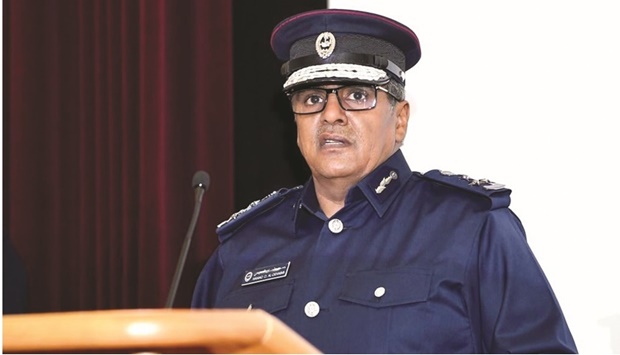The Ministry of Interior (MoI), represented by the General Directorate of Civil Defence (GDCD), yesterday launched the Civil Defence Technical Requirements Guide 2022, putting in place an updated mechanism to combat emergencies and adding more features to the existing guidelines. The 2022 guide was launched at a function held at the Officers’ Club of the GDCD in the presence of senior officials at the ministry, including Brig Hamad Othman al-Duhaimi, director-general of Civil Defence. Representatives of consulting offices and contracting and engineering companies were also present.
Brig al-Duhaimi noted that the updated manual is the result of the efforts made by members of the committee assigned to prepare the guide for more than two years. “The guide includes all engineering requirements related to prevention systems in buildings,” he said, adding that it was updated with some new requirements to keep pace with urban development in the country. The guidelines will be applicable from now, he noted.
The guide has been developed in co-operation with the authorities concerned and includes all the engineering requirements related to the construction scenario in the country. It retains the existing requirements while adding some essential features. Brig al-Duhaimi thanked all government and private agencies for their contribution towards updating the guide. During the inaugural ceremony, an introductory video was shown highlighting the efforts of the working team assigned with preparing the guidelines, the stages of their completion and the most important updates that were made regarding building requirements and standards for protection systems.
Capt Abdulrahman Sultan al-Ghanim, one of the members of the technical team, gave a presentation on the updates of the Civil Defence Technical Requirements Guide, the efforts of the committee concerned with its development and its objectives of protecting lives and property and keeping pace with in terms of fire safety requirement updates that the international community issues on an ongoing basis.
He also explained the updated requirements that came into effect in line with the observations of the private sector and in co-ordination with various relevant government agencies.
Capt al-Ghanim pointed out that the first version of the requirements was prepared, approved and implemented in 2015, noting that the updates included in the guide are in line with the requirements of a number of authorities, such as Qatar Electricity & Water Corporation (Kahramaa), educational facilities, nurseries and mosques. According to him, the guide was prepared in line with the needs of people with disabilities in hotels as well as the requirements for storing hazardous materials in laboratories. Also, it has a special chapter for workers' accommodation buildings and the update of ventilation requirements for warehouses and industrial facilities.
The director-general of Civil Defence honoured the engineers of the consulting offices who participated in preparing and reviewing the Civil Defence Technical Requirements Guide 2022.
On the sidelines of the launch, the GDCD organised a technical workshop for specialists to introduce the design and construction requirements for fire prevention control systems. In addition, technological developments related to firefighting systems, conditions approved by the authorities concerned in the country, and the updated technical requirements to enhance safety and protection systems in buildings and facilities were also discussed at the workshop.
Brig al-Duhaimi noted that the updated manual is the result of the efforts made by members of the committee assigned to prepare the guide for more than two years. “The guide includes all engineering requirements related to prevention systems in buildings,” he said, adding that it was updated with some new requirements to keep pace with urban development in the country. The guidelines will be applicable from now, he noted.
The guide has been developed in co-operation with the authorities concerned and includes all the engineering requirements related to the construction scenario in the country. It retains the existing requirements while adding some essential features. Brig al-Duhaimi thanked all government and private agencies for their contribution towards updating the guide. During the inaugural ceremony, an introductory video was shown highlighting the efforts of the working team assigned with preparing the guidelines, the stages of their completion and the most important updates that were made regarding building requirements and standards for protection systems.
Capt Abdulrahman Sultan al-Ghanim, one of the members of the technical team, gave a presentation on the updates of the Civil Defence Technical Requirements Guide, the efforts of the committee concerned with its development and its objectives of protecting lives and property and keeping pace with in terms of fire safety requirement updates that the international community issues on an ongoing basis.
He also explained the updated requirements that came into effect in line with the observations of the private sector and in co-ordination with various relevant government agencies.
Capt al-Ghanim pointed out that the first version of the requirements was prepared, approved and implemented in 2015, noting that the updates included in the guide are in line with the requirements of a number of authorities, such as Qatar Electricity & Water Corporation (Kahramaa), educational facilities, nurseries and mosques. According to him, the guide was prepared in line with the needs of people with disabilities in hotels as well as the requirements for storing hazardous materials in laboratories. Also, it has a special chapter for workers' accommodation buildings and the update of ventilation requirements for warehouses and industrial facilities.
The director-general of Civil Defence honoured the engineers of the consulting offices who participated in preparing and reviewing the Civil Defence Technical Requirements Guide 2022.
On the sidelines of the launch, the GDCD organised a technical workshop for specialists to introduce the design and construction requirements for fire prevention control systems. In addition, technological developments related to firefighting systems, conditions approved by the authorities concerned in the country, and the updated technical requirements to enhance safety and protection systems in buildings and facilities were also discussed at the workshop.


